Artificial intelligence (AI) is making waves in the insurance industry, streamlining operations, boosting decision-making, and improving customer experiences . From underwriting and fraud detection to claims processing, AI is helping automate tasks, spot patterns, and predict risks. This means insurance companies can work more efficiently and offer personalized services to their clients.
As AI technology advances, its use in insurance is increasing. Companies are adopting AI to stay competitive, tackle new challenges, and cater to the demand for hyper-personalized services. This article will dive into the current state of AI in the insurance market , sharing key statistics and facts that highlight its impact. We'll look at market segmentation, the main drivers behind AI adoption, real-world examples, and the competitive landscape.
In this article, you'll learn about:
- Segmentation of the AI insurance market
- Key drivers affecting AI adoption in insurance
- Real-world examples of AI implementation in insurance
- The competitive landscape of AI in insurance
Let's dive in to see how AI is reshaping this sector!
Take your software to new heights with AI/ML solutions
Insurance AI market size
Insurance AI market sizeWith the segmentation in mind, let's dive into key statistics on AI in insurance. These insights will highlight how AI is currently being utilized in the industry, showcasing trends, adoption rates, and its overall impact.
The global AI in insurance market size was $4.59 billion in 2022 and is projected to reach approximately $79.86 billion by 2032, growing at a compound annual growth rate (CAGR) of 33.06% from 2023 to 2032.
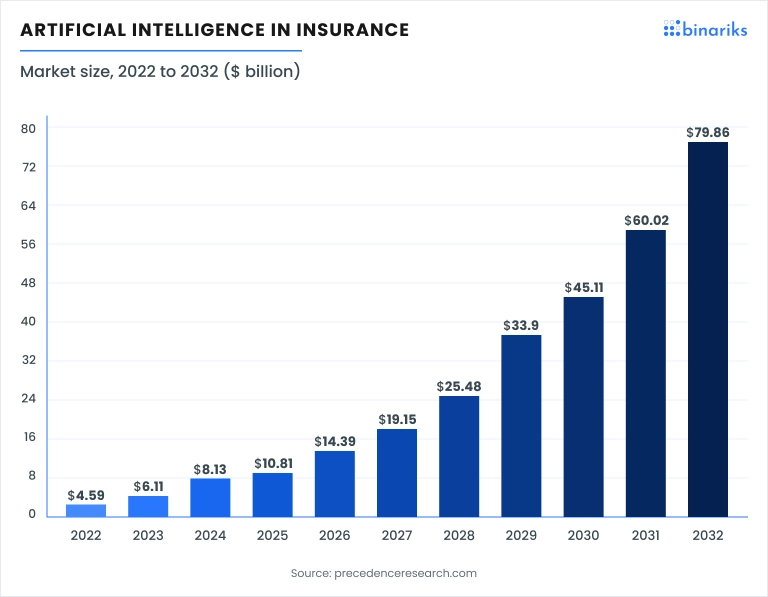
North America led the market in 2022 and is expected to maintain its dominance, driven by leading insurance companies like Prudential Financial, MetLife, and Berkshire Hathaway in the United States. The region's growth of AI in insurance is fueled by an increasing number of individual policyholders and a focus on faster, more efficient services.
Asia Pacific is poised for the fastest growth, driven by a rising population, expanding middle class, and increasing demand for affordable insurance products. The growing consumer base and need for efficient risk management are boosting the adoption of advanced AI solutions. Government support for AI-based services across various industries further accelerates market growth in this region.
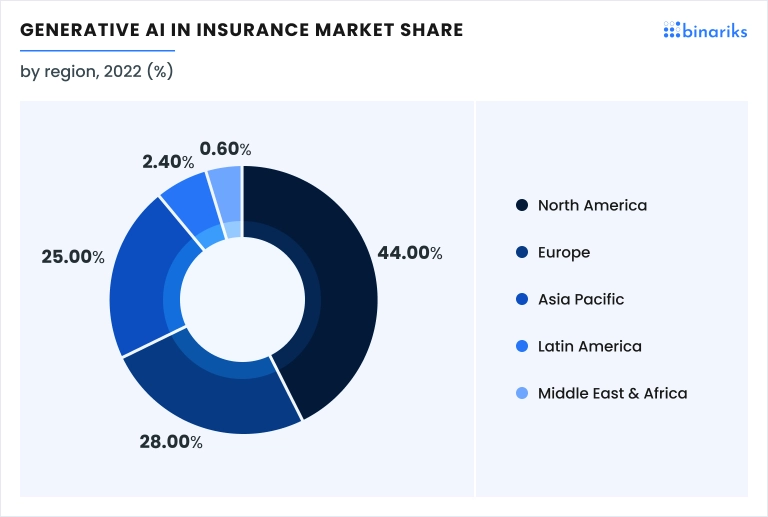
According to a KPMG survey of US financial services executives, more organizations plan to experiment with AI in the coming year. Respondents indicated they will focus on:
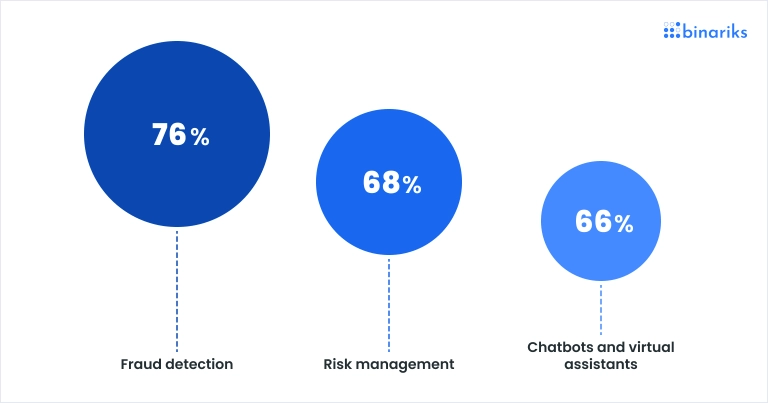
Although global insurance companies are heavily investing in AI, they face significant ethical challenges, including biases in data that can lead to unfair outcomes and the complexity of AI algorithms which can hinder transparency.
Another important thing is AI readiness. AI readiness in the insurance industry involves evaluating how well companies are prepared to adopt and integrate AI technologies. This includes assessing current technological infrastructure, workforce skills, data quality, and regulatory compliance. Being AI-ready helps insurers effectively implement AI solutions, improving efficiency and customer service .
According to a report by Datos Insights launched in Q3 2023, insurers are actively assessing their AI readiness to support advanced AI capabilities, providing a framework to guide their AI initiatives.
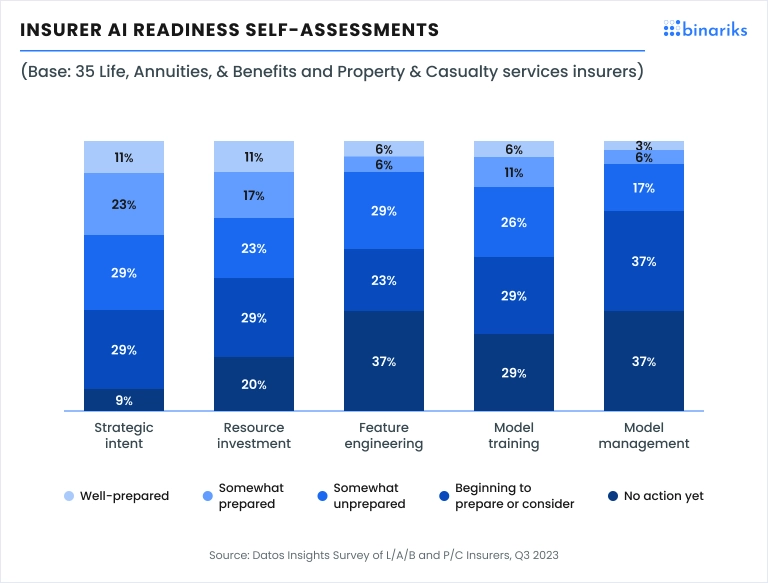
To conclude the block, here are some insights from the latest Red Hat Summit (Source ). As the insurance industry evolves, AI integration will be crucial in shaping its future. Companies need strategic approaches to leverage AI for enhancing products, streamlining operations, and improving customer experiences. Technologists can help implement AI within the company's governance and operating model.
Adopting a platform approach and embracing AI allows insurance companies to achieve sustainable growth, operational efficiency, and competitive advantages. The key is to start small, experiment, and iterate, gradually integrating AI into all business aspects.
AI insurance market segmentation
AI insurance market segmentationLet's categorize the market to better understand how AI technologies are used and their roles within the insurance industry. This table will give us a glimpse of the market and set the stage for a deeper analysis of trends and AI statistics in insurance:
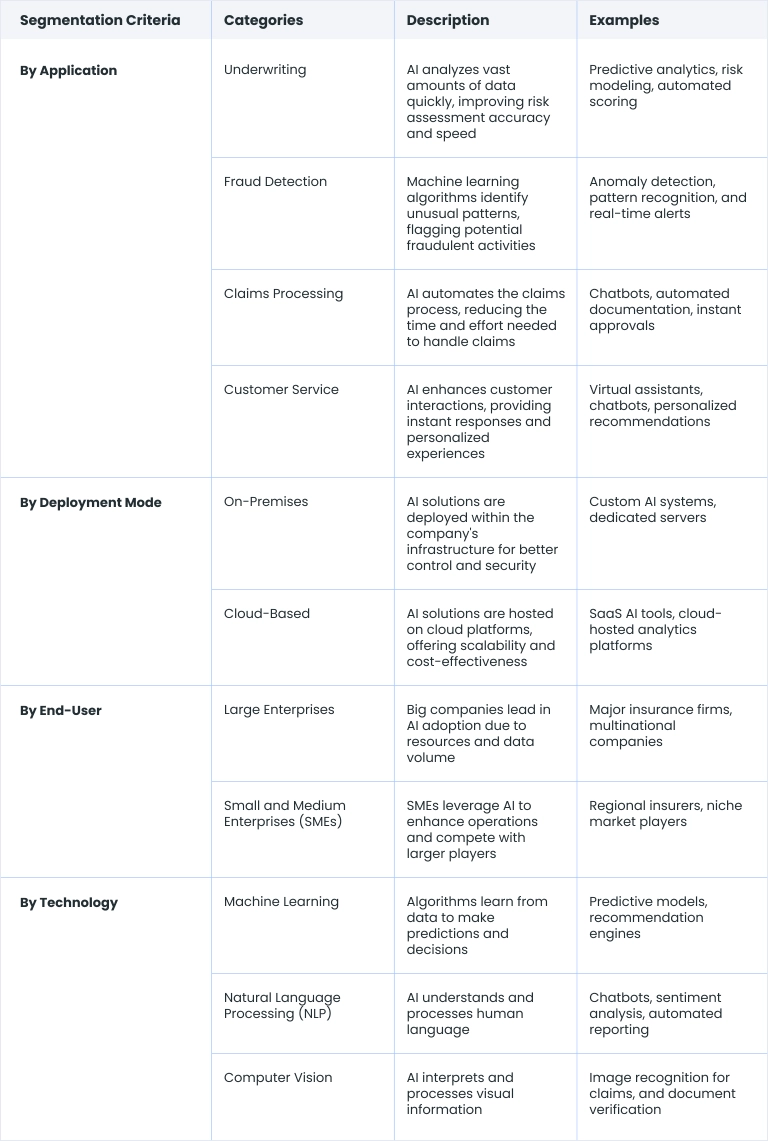
AI insurance market by application
AI insurance market by applicationThe AI insurance market is segmented by various applications, each bringing distinct advantages and transforming different facets of the insurance industry.
Underwriting and risk assessment
AI significantly improves the precision of risk assessments and underwriting by rapidly analyzing extensive datasets. This enables insurers to offer more accurate pricing and tailored coverage options, benefiting both insurers and policyholders.
Insurance firms are increasingly investing in AI and machine learning to enhance risk management processes, including risk exposure identification, evaluation, and effect assessment. The AI in insurance market size continues to grow as more companies adopt these advanced technologies.
Fraud detection
AI-based models excel at identifying complex fraud schemes. Machine learning algorithms continuously adapt to detect new fraudulent patterns, enhancing the security and integrity of the insurance process. This proactive approach helps insurers mitigate risks and reduce losses.
Claims processing
AI automates the traditionally slow claims processing , reducing the time from weeks to just a few days or even hours. Smart bots handle claims efficiently, minimizing the need for extensive human intervention and speeding up the entire process, which results in higher customer satisfaction and lower operational bottlenecks.
Customer service
AI enhances customer interactions by streamlining processes like obtaining quotes, filing claims, and submitting information. This makes interactions faster and more seamless, leading to higher customer satisfaction. AI-driven personalization tailors experiences to individual needs, significantly improving engagement.
According to a study from the Edelman Trust Institute, 51% of consumers say businesses fail to connect with them when interactions are inauthentic and generic (Source ).
Data utilization and predictive analysis
AI leverages vast amounts of data to provide tailored customer interactions and predictive insights. The increasing interconnectivity of devices (IoT) allows AI to analyze data from various sources, offering relevant content and suggestions.
Predictive analytics help insurers anticipate customer needs, reduce churn, and detect fraud more effectively. These AI in insurance stats underscore the importance of data utilization and predictive analysis in modern insurance practices, with the International Data Corporation estimating 55 billion IoT-connected devices by 2025 (Source ).
Embrace InsurTech innovation with custom software development
AI adoption challenges within the insurance industry
AI adoption challenges within the insurance industry- Data quality and management: Ensuring high-quality data is critical for AI effectiveness. Insurers often deal with fragmented and inconsistent data from various sources, making integrating and managing AI systems challenging. Robust data governance and cleaning processes are essential to maximize AI's potential.
- Regulatory compliance: The insurance industry is subject to stringent data privacy and usage regulations. Implementing AI solutions requires careful navigation of these regulations to avoid legal penalties and protect customer data. This involves ongoing monitoring and adjustments to comply with evolving laws.
- Integration with legacy systems: Many insurance companies rely on outdated legacy systems incompatible with modern AI technologies. Integrating AI requires significant investment in updating these systems or creating interfaces that allow new technologies to work with old infrastructure. This process can be both costly and technically challenging.
- Ethical and bias concerns: AI systems must be designed to ensure fairness and avoid biases that could lead to unfair treatment of policyholders. Insurers must implement rigorous testing and validation protocols to identify and mitigate any biases in AI algorithms, maintaining trust and credibility.
- Cost and resource allocation: Implementing AI involves substantial upfront technology acquisition, training, and ongoing maintenance costs. Insurers must strategically plan their budgets to accommodate these expenses while ensuring that the long-term benefits justify the initial investment.
Addressing these challenges is essential for insurers to fully leverage AI's potential and transform their operations for greater efficiency and customer satisfaction.
Gain a competitive edge with our GenAI guide
Discover actionable insights, adoption strategies, and future trends.
Revolutionize insurance with Generative AI

Artificial intelligence in insurance market companies
Artificial intelligence in insurance market companiesTo illustrate the impact of artificial intelligence in the insurance market, let's look at some real-world examples of successful implementation.
Simplifai
It's not exactly an insurance company, but Simplifai, renowned for its AI automation solutions, has introduced Simplifai InsuranceGPT, the first custom GPT tool specifically crafted for the insurance sector.
This product is essential to know because it addresses inefficiencies in insurer-customer communication, offering swift, accurate responses through AI while ensuring data security and privacy. By seamlessly integrating with platforms like Salesforce and HubSpot, and requiring no technical expertise for deployment, InsuranceGPT enhances operational efficiency and supports regulatory compliance.
This innovation highlights how AI can be tailored to meet the specific needs of the insurance industry, marking a significant step forward in AI-driven business process automation (Source ).
Bajaj Allianz
Bajaj Allianz General Insurance has partnered with actyv.ai to offer innovative insurance products through their technology platform to enterprises and the partner ecosystem across the supply chain. This collaboration aims to provide bite-sized commercial insurance products, such as fire and burglary insurance, along with group health products like personal accident and hospital cash plans.
The partnership leverages AI to enhance financial protection for businesses, particularly MSMEs, by offering tailored insurance solutions that ensure sustainability and resilience (Source ).
Lemonade
Lemonade set a groundbreaking world record by processing an insurance claim in just 2 seconds using their sophisticated AI system. A customer reported a stolen coat, and the AI quickly verified the claim, checked for potential fraud, and approved the payout almost instantly. This achievement highlights the transformative potential of AI in the insurance sector, significantly reducing the time and effort traditionally required for claims processing.
Lemonade's AI not only enhances speed and efficiency but also ensures accuracy and reliability in claims handling. This innovation sets a new benchmark for customer service in the insurance industry, demonstrating how technology can provide rapid, trustworthy solutions, thereby greatly improving customer satisfaction and operational efficiency (Source ).
AXA
AXA leverages AI and data analytics to boost its revenues in Hong Kong by enhancing customer insights and operational efficiency. By using AI, AXA can analyze vast amounts of data to better understand customer behavior and preferences, leading to more personalized insurance products.
Data analytics also improves risk assessments and streamlines claims processing, making the entire insurance process faster and more accurate. This strategic approach not only drives revenue growth but also enhances customer satisfaction and loyalty, positioning AXA as a leader in innovative insurance solutions (Source ).
Final thoughts
Final thoughtsCompanies like Lemonade, AXA, and Simplifai are already setting new benchmarks with rapid claim processing, personalized services , and advanced data analytics. These advancements underscore the critical role of AI in driving growth and improving customer satisfaction in the insurance sector.
At Binariks, we make it easy for insurance companies to harness the power of AI. Our team specializes in machine learning, data analytics, intelligent document processing , and more to help streamline your operations and improve risk assessments .
We focus on enhancing customer experiences while reducing operational costs. By partnering with us, you'll gain practical AI-powered software tailored to your needs , ensuring you stay competitive and efficient. Contact us today , and let's unlock AI's full potential for your business.
Share

